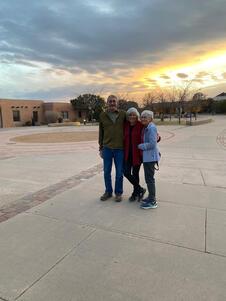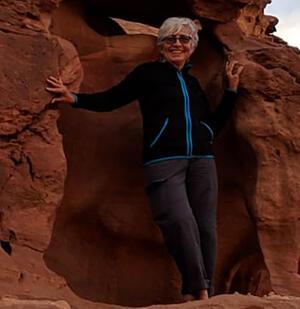Vivian Silver
Speak truth to power. We admire people who speak truth to power. It takes a lot of courage, a lot of guts. With truth as a calling card, that person holds up a new vision, challenges the prevailing wisdom, and shows how the dynamics of power can be shifted between the recognized leader and those who are led. Truth is the warning flare, the musical baton, and the megaphone.
When my beloved friend Vivian Silver was believed to be taken hostage by Hamas on October 7th, and later when her death that day on Kibbutz Be’eri was confirmed, many people shared anecdotes and posted tributes about her lifelong habit of speaking truth to power. This extremely nice activist from Winnipeg evoked powerful memories, layered with admiration for her bold vision, beliefs, and actions. Gazans, Palestinians, and Jews worldwide honored Vivian’s quiet strength and the tenderness she devoted to relationships. No matter how big her ideas or how sweeping the changes she proposed, her tone was courteous and her actions were kind. Everyone recalled her dazzling smile.
In 1974, Vivian emigrated from a commune in Brooklyn to Kibbutz Gezer in Israel. She brought the values cultivated in the socialist Zionist Habonim youth movement and the broadened perspective gained at the North American Jewish Students Network and the Jewish Student Press Service. Vivian immersed herself in second wave feminism, both the secular movement and the Jewish movement, two streams that converged in the Network’s National Conference of Jewish Women in 1973, held at the McAlpin Hotel in New York City.
That year, as a new high school graduate, I was given a precious spot on the Planning Committee. With awe and admiration, I witnessed how Vivian, at age 23, expertly navigated the decision-making process with Sheryl Baron Nestel, the Conference Coordinator. The result was a gathering of 400 women (including Vivian’s mother and mine) who spent the weekend reimagining the role of women in every field, from religion to academia to communal institutions and the family.
Later, at Kibbutz Gezer, Vivian experienced how sexism limited women’s personal and professional lives despite the popular notion that equality was fundamental to kibbutz life. Vivian decided to study the impact of gender bias on the kibbutz movement and in Israel more broadly. She tirelessly shared her data and insights to highlight the discrimination women experienced. Vivian also developed strategies and programs to intervene and level the playing field.
Despite being told by many that her work was unnecessary or that her North American views on women could never take root in Middle Eastern soil, Vivian persisted. The work of persuading kibbutz leaders and Parliament members to take responsibility for gender equity was relentless. But Vivian never turned away from an opportunity to shift people’s perspective, whether one-on-one or at a convening with hundreds in attendance. As she once said, “Social change always appears slowly, over time, like bulbs that have to mature in the soil before the plant can grow upward and start blooming.”
Vivian’s research led to an entire field of study related to women in kibbutz life. Vivian founded the United Kibbutz Movement’s Department to Advance Gender Equality in 1981, and she served on a Knesset subcommittee for the Advancement of Women in Work and the Economy. Meanwhile, on Kibbutz Gezer, Vivian assumed roles rarely held by women, from leading construction projects to becoming one of only seven women serving as director generals of the 150 kibbutzim in Israel.
Vivian’s insistence on speaking up and engaging in uncomfortable conversations continued when she became a committed community leader and peace activist. In 1990, after leaving Kibbutz Gezer with her husband Louis and sons Chen and Yonatan, she moved to Kibbutz Be’eri near the Gaza border. There she served as CEO of NISPED—the Negev Institute for Peace and Development Strategies, building relationships with the Bedouin community, with Palestinian Israelis, and with Palestinians in the West Bank and Gaza.
Her work in the region around peace, community development, and economic growth led to a partnership with Amal Elsana Alh’ joojj. A trailblazing feminist, peace activist, and community organizer, Amal grew up in the unrecognized Bedouin village of Tel Arad. She worked as a shepherd in that historically patriarchal society until the age of seventeen, when she founded Desert Embroidery, the first organization devoted to Bedouin women’s empowerment and job training.
In 2000, Vivian and Amal established AJEEC—the Arab-Jewish Center for Equality Empowerment and Cooperation. Their partnership was embedded in the shared vision of a world in which Bedouin and Jewish women could cultivate genuine connection. Together they equipped Bedouin women to access well-paying jobs acceptable to their traditional communities, including a catering business and roles as wedding photographers and disc jockeys.
While Amal and Vivian shared a commitment to tangible goals, they often disagreed on the means to achieve the ends. As Amal recalled at a memorial in New York City on December 17, 2023, “We were both very stubborn. We were both very bossy.” Their passions could erupt into fierce arguments, and both would leave the office in tears. Later they would meet at a café to talk through their differences. What Amal valued most—and Vivian came to understand—was their need to hold onto their “multiple identities” even when this brought them into conflict. For Vivian and Amal, staying connected and speaking truth through tears was at the core of their partnership. They recognized and accepted each other, fully.
Vivian was a lifelong peace activist. She worked with the New Israel Fund, B’tselem, and many other organizations to nurture civil society, advocate for human rights, end the occupation, and achieve a negotiated peace agreement. After retiring from NISPED, she devoted herself to movement work, bringing her voice into the chorus (and sometimes the cacophony) of opinions and ideas that emerged from Women Wage Peace, the interfaith grassroots organization created by Arab and Jewish Israeli women in 2014.
Vivian both led the way and stood with others in Women Wage Peace, during hundreds of meetings and WhatsApp threads and through long hot days of protest. Sometimes she was discouraged that her sister activists could not step away from their disagreements and make crucial decisions.
It also was disappointing to her that many of the kibbutzim members on the border of Gaza did not always support the goals of Women Wage Peace.
In 2014, Israel’s short war with Hamas—Operation Protective Edge—resulted in painful Israeli casualties. Despite the disapproval of other members in her kibbutz, Vivian continued to stand with Women Wage Peace on the side of the road, calling for an end to war. She experienced the anguish and anger of her Israeli neighbors. Nevertheless, she persisted. Vivian refused to let herself be defined or divided by the polarization that ripped apart relationships among friends and colleagues.
We think that speaking truth to power is the greatest challenge. What I learned from Vivian is that speaking truth to peers is more difficult. It is painful to confront our neighbor, our friend, our sister committee member, another Israeli, another Jew, a Palestinian colleague, a Bedouin partner, and say:
I disagree with you. You think we can’t end this war. I believe we must negotiate an end to the occupation and a beginning to peace, no matter how terrifying the consequences or what may be unleashed.
Speaking those truths to peers—about war and peace, occupation or negotiation, sexism or equality—is hard and frightening. But Vivian believed that the only way to make change is to build trust and do the necessary work with our heads, hands, and hearts. That is now our responsibility.
In 2024, Vivian’s family and friends are launching the Vivian Silver Impact Award to honor two women annually, Arab and Jewish, who demonstrate great promise and whose accomplishments reflect Vivian’s values in building Arab-Jewish partnership in Israel: promoting peace between Israel and Palestine and advancing women to leadership positions. This award seeks to ensure that Vivian’s more than 50 years of empathy, cooperation, and activism will be recognized and supported into the future.
Power always needs to be called to account, but it is through empathy and conversation with our peers that we acknowledge our shared humanity, reckon with our choices, and plot the next steps toward equality, justice, and peace. Each and every day, I ask myself, What would Vivian do? Vivian showed me what it means to stay in the struggle. She taught me how to move through that painful place called despair and step forward with integrity and hope.






I mourn her murder. Ironically at the hands that she wanted to make peace with. As Rabin said, we don't make peace with our friends, but with our enemies. בעזרת השם we will find the way and unfortunately with force. But it must be found.
Thank you so much for writing this. There is so much about relationships across these "lines" that is hard, and the ability to disagree and still love someone is essential to healing our crazy world. May Vivian's memory forever be a blessing.
A beautiful tribute to Vivian, her life, her values, ideals and hard work , but mostly to the fine and special person she was.
Thank you, Shifra.
A beautiful and inspiring tribute that instills in me both hope and perspective about the struggles we will face in seeking peace and equity in the years ahead.
A beautiful tribute to a beautiful soul and compelling charge to us all.
Thank you, Shifra, for bringing Vivian alive and for letting us know more about her work and the plans for an award in her honor!